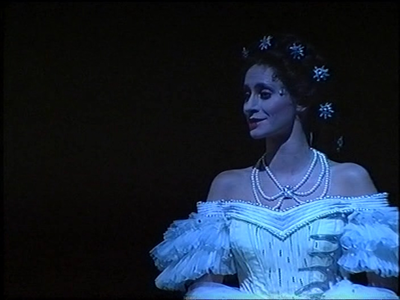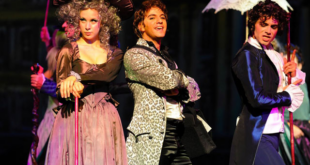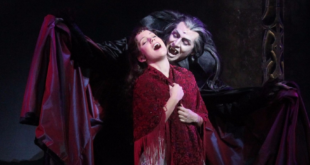Elisabeth Das Musical is by no means a fairy tale but rather a biography of Empress Elisabeth (Sisi) and a philosophical tragedy about freedom, fate, and death.
Although the historical Sisi has been adorned with many beautiful labels by people worldwide—possessing stunning beauty, loved by the wide subjects of the Austro-Hungarian Empire, and having a unique appreciation for romantic poetry—the musical portrays a Sisi more human than goddess. It uses a critical realist approach to tell the tragic story of Elisabeth’s life—delusion of love, mistakes in marriage, and deception of politics. At 15, she fell in love with the Austrian Emperor Franz Joseph I by accident. Naive and inexperienced, she got embroiled in a palace power struggle with her authoritarian mother-in-law, Archduchess Sophie. She bore several children but never experienced the joy of family life, forced to give up her children’s custody to Archduchess Sophie at first and losing one child to early death while another to suicide. Her husband, though loving, was weak and ineffectual, and her marriage was plagued by betrayal. To escape politics, she spent most of her life traveling across Europe, finding solace in reading and writing poetry. She is clearly not perfect, for her fight for the custody of her children is out of eagerness to prove her strength to Archduchess Sophie instead of genuine love; she rejected Rudolf’s plea after his failed coup coldly, ultimately leading to her son’s suicide at Mayerling. In her later years, after her son’s death, Elisabeth wore only black, carried a parasol to shield herself from the sun, and used a fan to hide her face. She wandered across Europe and was eventually assassinated by an anarchist in Geneva. Ultimately, behind her turbulent life lay a tumultuous era. The decline of the Austro-Hungarian Empire from its peak to its precarious state, the decadence and stupidity of the nobility, the struggles of the exploited and oppressed people, the banality of the bourgeoisie, and the rise of nationalism and anti-Semitism are all captured in the musical. The scent of impending World War I is pervasive, and Elisabeth’s personal fate is entirely dictated by the context of her time.
Instead of using romance as a selling point, the musical focuses on Sisi’s despair with the royal family, her longing for freedom, and her attitude towards life and death. Although the love between Franz and Sisi is touched upon, and Der Tod (The Death) is fictionalized to love Elisabeth, these romances are too insignificant compared to the overarching theme of freedom. From this perspective, the entanglement between Der Tod and Elisabeth is less about romantic love and more about the struggle between life and death. Such a powerful, serious non-romantic theme are rarely seen on the musical stage.
The seriousness and realism of Elisabeth Das Musical are major reasons why I admire and am fascinated by it so much. The protagonist’s flaws often overshadow her virtues, turning the spotlight into a gallows, giving the audience a pure enjoyment of witnessing the tragic beauty of destruction. Seeing Sisi traveling alone and abandoning Rudolf leaves a lump in my throat — but is there any life without contradictions and complexities? Elisabeth is not a saint. Instead, she is a black petrel. Black, the color of death. Petrel, the symbol of freedom. To fly freely, one must endure the pain of captivity. Besides, destroying the chains often causes others’ suffering. How can this be reconciled? Maybe death is the ultimate, only freedom. Elisabeth Das Musical invites us to explore our own answers while presenting an epic of freedom and humanity. No doubt it is my favorite among all the other amazing musicals — I watched it more than 5 times but still feel incapable of writing a deep reflection as I gain new thoughts each time. It is also because of this musical that I started to self-learn German (even though, oddly, I can only understand German in a song but not in a conversation).
Another reason why I love this musical so much is due to its portrayal of each character as sophisticated and multi-faceted. Besides the protagonist, one of my favorite characters is Franz’s mother and Elisabeth’s mother-in-law — Archduchess Sophie. Despite her wicked acts to Elisabeth, she is ultimately a tragic character trapped in the tide of history. This line in Bellaria is just so heart-breaking, revealing the most stifling truth of responsibility and reality: “Hart zu sein und streng war nicht leicht für mich. Wer die pflicht vergisst muss zugrunde geh’n” (Do you think being ruthless is easy? The royal family cannot forget its duty. Who forgets his duty must perish). She is not a simple antagonist; instead, she is a vivid and substantial person and, tragically, a puppet of the monarchy. One can’t help to imagine that several years ago, at a quiet corner of Schönbrunn Palace, maybe there was a young girl named Sophie who looked at the delicate ceiling and yearned for dreaming and writing poems and riding with the wind. Such detailed portrayals and realistic recreations of historical figures make me obsessed with and willing to repeatedly delve into these roles and singing passages, exclaiming in wonder each time. Plus, her songs sound so oddly electrifying to me, even though they are supposed to be authoritative and repressive (maybe because it is so powerful and that my German is just too bad so that only the marching tempo leaves an impression).
One ending line in Der Schleier fällt (The Veil Descends) can summarize Sisi’s life very well: “Ich weinte, ich lachte, war mutlos und hoffte neu. Doch was ich auch machte, mir selbst blieb ich immer treu” (I cried, I laughed, was dispirited and renewed my hope. But whatever I did, to myself I remained ever true). Just as the assassin Lucheni sarcastically says, “She is high and mighty, arrogant, and looks down on you all.” Indeed, Sisi’s powerful presence and self-awareness make it seem that she only sees herself in the mortal world. On stage, at the end of the first act, she neither looks at Der Tod nor her husband but instead flips her fan and gazes at herself in the mirror — she belongs only to herself, worships only herself, follows only her heart, and cares only about her feelings. One can call this selfish, but who can say this selfishness is not a precious heroism in a time of chaos, desperation, death, and the absence of freedom?
Death often takes on a fantastical image, for death, in people’s eyes, sometimes represents not destruction but liberation and rebirth, with significance sometimes surpassing life. In Elisabeth Das Musical, Death is portrayed with a handsome, noble, Heine-like face, as this is Elisabeth’s Death. As Mate Kamaras, who played Der Tod in 2005, said, Death has many faces. The specific image of Death is likely a creation of one’s own mind, stemming from personal perception and imagination. Upon their first unexpected encounter, Der Tod is captivated by Elisabeth’s insatiable yearning for freedom, which is precisely what he can offer her. However, in her lifetime, Elisabeth continuously seeks freedom and peace through her own efforts, rejecting the love of Der Tod. While he extends his hand like a gentleman, inviting her to dance, Elisabeth pushes him away and gradually takes the lead in their dance. His arrogance is repeatedly defeated by Elisabeth’s confidence and her will to live, and it is this sense of meeting an equal that intoxicates him.
As Elisabeth gradually loses this ability to love life after Rudolf’s death, the Habsburg Empire’s glory is also gradually slipping away, with its downfall inevitable. Der Tod decides to grant Elisabeth freedom, handing a stiletto to Lucheni, who then assassinates Elisabeth in Geneva. Elisabeth, assassinated, sheds her dark coat, revealing a white dress, like a butterfly emerging from its chrysalis, shouting, “Mach die Nacht zum Morgen, Lass mich befreit sein und geborgen. Lösch die Erinn’rung in mir aus. Gib’ meiner Seele ein Zuhaus” (Turn the night into dawn, give me freedom, give me peace. Erase my painful memories, let my soul rest forever). Der Tod sings back, “Lass die Welt versinken!” (Let the world sink into it!)
Let the world sink, let the Death embrace those who spent their lives pursuing freedom, let the descendants of black petrels break through the cage, scattering feathers to draw the boundaries of a new world, pointing out the immortal kingdom of freedom.
Before Der Tod’s final kiss, Elisabeth’s concluding words lead to their climactic duet: “The world will search in vain for the meaning of my life. For I belong only to myself!”
Denn ich gehör nur mir!
(For I belong only to myself!)
— Elisabeth, a free black petrel gliding through the tempests of time
 Tempus Magazine By Students, For Students
Tempus Magazine By Students, For Students 



